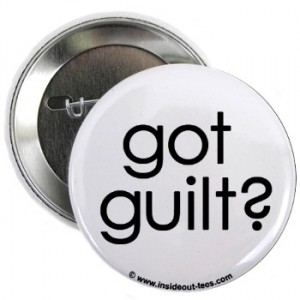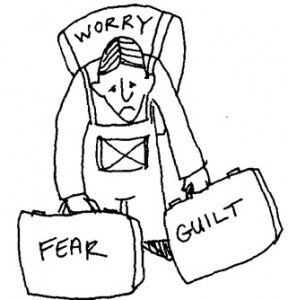Stepfather Quote & Wisdom (Part I) ~ John Locke

Parents wonder why the streams are bitter, when they themselves have poisoned the fountain.
~ John Locke
In an earlier series, I wrote about the various parenting styles: authoritative, authoritarian, permissive (indulgent) and uninvolved. An aspect of the permissive or indulgent style is guilt parenting. In this post, I’ll talk about what is guilt parenting and how to recognize it. The next post will discuss what makes guilt parenting bad and strategies on how to break the cycle.
Healthy boundaries are needed to help the blended family run smoothly and for the emotional health of all the family members. Even if breaking a boundary seems like the right thing to do, it negatively impacts everyone involved.
Guilt parenting is one harmful outcome of having broken boundaries. It can happen in both blended and nuclear families. It occurs frequently in blended families with both the custodial and non-custodial parent, although it is more common with non-custodial parents.
What is Guilt Parenting?
- Parent chooses to parent their children out of guilt or fear rather than doing what is right or best.
- Usually involves rewarding poor behavior and the guilty parent has many excuses.
- A guilty parent may feel guilty about not seeing their child every day,
- putting their child through a divorce,
- a new marriage or a new sibling,
- moving the child from a place they are familiar and comfortable with,
- or many other reasons.
- A guilty parent may be afraid of losing the relationship with their child and the child won’t
- want to come visit anymore, or
- like the parent, or
- think the parent is cool.
Another aspect of guilt parenting is the parent only sees the present situation. The parent sees their child is upset. In response, the parent feels guilty or fearful and reacts to these feelings rather than what is best for the child and the entire family. If the parent really wants what is best for the child and the family, the parent needs to step back and look at the big picture. The guilty parent should answer these questions:
- What is this teaching my child?
- How is this helping or hurting my child’s future?
- How will this make the other children in the family feel?
- What does my spouse think of this?
Recognizing Guilt Parenting
There are probably as many different ways to guilt parent as there are guilty parents.
Symptoms of Guilt Parenting
- When a child wants something and starts to throw a tantrum or start crying, and the parent gives the child what they want.
- If a child starts yelling at or bossing the parent, the parent complies with the child as if the child were the parent and the parent were the child.
- If a child is given more of a say in household matters than the adults is a telling sign of guilt parenting.
- Often a parent who guilt parents will give the child equal or top say in how things are run in the home.
- Buying presents for the child on an unusually frequent basis is another symptom of guilt parenting.
- One guilty dad used to take his child shopping every time he picked her up for a visit which was 1-2x a week.
Excuses for Guilt Parenting
- “I just want her to feel at home here,”
- “I want her to know how much I love her,”
- “I don’t want him thinking I am mean,”
- “I don’t want him to not want to come and visit anymore,”
- “I have to protect my child,” etc.
If you are the spouse of a guilty parent you could hear the following:
- “You hate my child!”
- “You don’t care about my child!”
- “You are out to get my child!”
- “You don’t want my child to have anything good!”
- “You don’t want my child to be a part of this family” etc.
If you also have children, you will probably feel it is their children versus your children. Often the guilty parent will come across as having a strong victim mentality, nothing is their fault or their child’s fault.
We all want to think of ourselves as good parents, but the reality is all parents make mistakes. In his book, Parenting Without Guilt, the author Tom Couser identified seven of the most common pitfalls of parenting and developed action plans to help parents overcome those mistakes. Parenting Without Guilt also contains a companion Bible study that can be used for personal study or for group discussion. Click on the book to purchase a copy.






